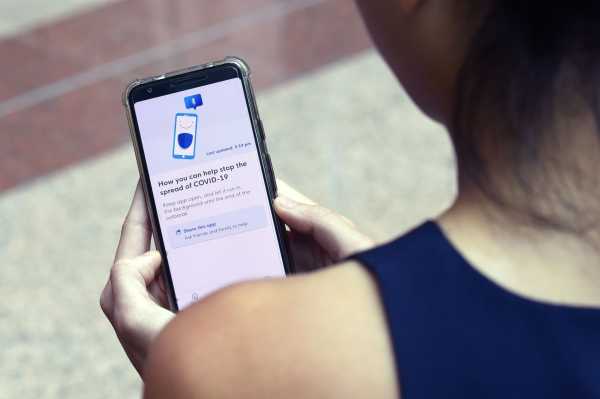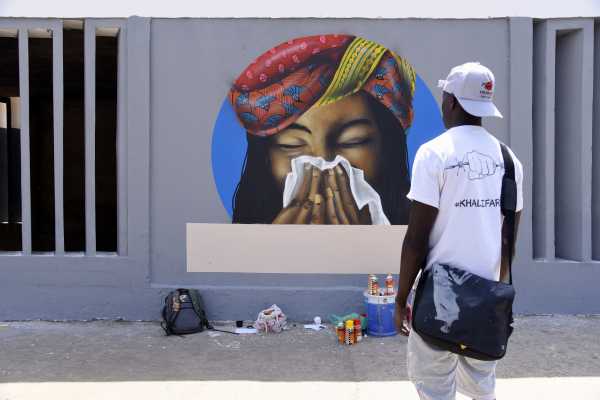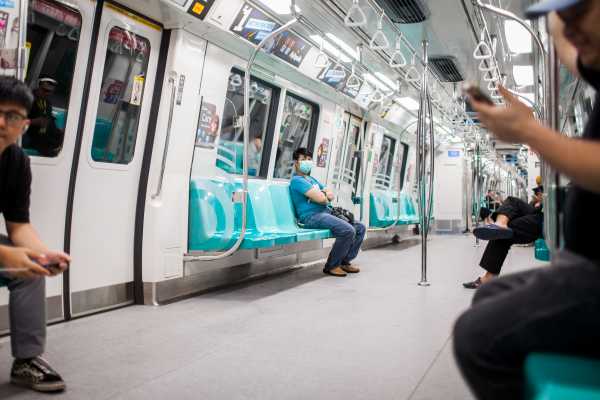
The novel coronavirus is a global health crisis, and the ways countries worldwide are attempting to stymie the disease’s outbreak are wide-ranging. In the United States, for example, many heavily populated areas have enacted “shelter-in-place” initiatives to keep the number of infected people from growing quickly. Businesses deemed nonessential have closed. At least one city has even offered official guidelines on how to safely have intimate relations during this time, most of which imply “don’t have them at all.”
But some African, Asian, European, and South American countries are responding quite differently. Below is a sampling of the ways different countries have been working to protect citizens from the Covid-19 virus.
South Korea
South Korea has some of the world’s most comprehensive protective measures in place, according to experts. And they’re certainly some of the most novel, too. One option for Covid-19 testing — which South Korea has made more readily available than most other countries — involves public “phone booths.” A hospital in Seoul has installed them around its building to offer easy, quick testing to people worried they may have the disease.
The way it works is spectacular: One person at a time can enter one side of the glass-walled booth and grab a handset connected to a hospital worker standing on the other side of the glass. After a consultation, the staff member can stick their arms into rubber gloves embedded into the booth to swab the patient quickly, collecting a sample before the booth is quickly disinfected. The hospital says the seven-minute exam allows it to test almost 10 times as many samples as it could without the special booths.
South Korea is one of the Asian countries experiencing the brunt of the coronavirus pandemic — the quick-fire test is an inspiring method to, hopefully, save more lives.
The Philippines
The response to the coronavirus in the Philippines has been highly criticized by experts around the world. The Philippines is struggling with many of the same complications other countries are, like inadequate testing and lack of personal protective equipment (PPE) for medical staff. But those problems have been exacerbated by chaotic and contradictory guidance from leaders.
On March 16, President Rodrigo Duterte announced he would be placing the country’s main island of Luzon — the seat of the capital city of Manila and its metropolitan area — under lockdown. About half the country’s population of 107 million live on Luzon, with 12 million of them in Manila.
However, government officials have repeatedly contradicted each other in discussions of what the lockdown entails, and who is allowed to go outside and why. It’s unclear whether or not public transportation will continue, or whether food producers should continue to work. The Philippine Chamber of Food Manufacturers Inc. has begun to warn of potential gaps in the food supply chain.
Like the United States, the Philippines acknowledges it doesn’t have enough tests to pinpoint the exact number of Covid-19 cases in the country. On March 21 it announced 307 total cases. There have been at least 25 Covid-19 deaths in the Philippines as of March 22, according to Johns Hopkins’ case tracker.
Italy
Italy, which has surpassed China as the country with the most Covid-19 deaths, is now the epicenter of the coronavirus pandemic. And as Kelsey Piper and Christina Animashaun wrote for Vox, the problem is not that Italy didn’t respond to the coronavirus. The problem is that it always responded slightly too late and with slightly too much moderation.
Italy had its first confirmed coronavirus case on February 20. But that patient had no contact with China, suggesting that he probably caught the virus from another European. “Who we call ‘Patient One’ was probably ‘Patient 200,’ ” one epidemiologist told the New York Times.
By February 23, the country had 123 confirmed cases and had sealed off 11 towns with checkpoints. But the early government response was ambiguous: while officials urged the public to practice social distancing early on and closed all public schools on March 4, they also urged Italians “not to change our habits,” with the mayor of Milan publicizing a “Milan doesn’t stop” campaign.
As the disease spread, the government began to respond more severely. On March 8, it locked down the north of the country, where the virus was first found. On March 9, it extended the lockdown to the rest of the country.
Now, as the death toll continues to rise, the lockdown measures are only tightening. As of Saturday, the public is no longer allowed to go outside to jog. Meanwhile, the number of new cases continues to soar.
Nicaragua
South America is one of the continents with the fewest confirmed cases. Some countries are slowly beginning to report hundreds of coronavirus cases, but others are responding by thumbing their nose at the disease.
Take, for example, Nicaragua: On March 14, Nicaraguan vice president Rosario Murillo organized what at least one reporter referred to as “a kind of walk and carnival.” The public rally, called “Love in the Time of Covid-19” (after the famed Gabriel Garcia Marquez novel), saw thousands of Nicaraguans marching, dancing, and carrying signs that explained how the coronavirus affects the respiratory system.
The event was held in honor of President Daniel Ortega, a controversial politician who runs what some critics call a dictatorship. But his supporters used the opportunity to celebrate their leader for what they considered his showing of solidarity for coronavirus victims worldwide. One of the easiest ways to spread the coronavirus, though? Clustering people together in public demonstrations. Nicaragua has not yet publicly stated whether anyone in the country has been infected.
Senegal
Senegal, which reacted rapidly and firmly to the Ebola outbreaks in its region in 2014, is similarly well-prepared for the coronavirus. The country is the home of the Pasteur Institute, a research lab that partners with the World Health Organization to fight viral outbreaks and is the creator of one of the first yellow fever vaccines. And now, the Pasteur Institute is teaming up with Mologic, a British biotech firm founded by the guy who developed the pee-on-a-stick pregnancy test, to create test kits that can diagnose Covid-19 within 10 minutes.
According to the Pasteur Institute, the kits will be released within three months and will only cost $1 per kit. “People will be able to do it themselves,” a spokesperson told the Washington Post.

Even without the 10-minute kit, Senegal’s testing capabilities are better than those of the US. They’re currently using test kits that diagnose patients within four hours.
Hong Kong
One of the first things many dog-loving Americans were told about the coronavirus was that our good doggos were immune to the disease. It was good news, because we love to kiss and hug and play with our pups — and dog-walking is a great and acceptable form of outdoor exercise during social isolation.
But recent news from Hong Kong suggests otherwise. On March 19, the Hong Kong Agriculture, Fisheries, and Conservation Department (AFCD) announced that a pet German shepherd had “repeatedly tested positive for the COVID-19 virus.” This is the second dog to be infected by the disease in Hong Kong, following a pet Pomeranian who tested positive earlier in March. The Pomeranian’s owner reportedly had the virus, and the dog died days after its release from a compulsory quarantine; no cause of death has been confirmed, however.
Experts insist the dog could not have died of coronavirus. Likewise, AFCD officials stressed that the dogs showed no symptoms, and that humans shouldn’t be concerned about transmission.
“There is currently no evidence that pet animals can be a source of Covid-19 for humans or that this virus can cause the disease in dogs,” an AFCD spokesperson said. “Pet owners should always maintain good hygiene practices and under no circumstances should they abandon their pets.”
What this means, though, is taking a precaution that many of us pet owners around the world likely never considered: Don’t give your pet a hug or a kiss on the head.
Singapore
“Singapore has done everything right,” one expert told STAT News. After the horrors of SARS 17 years ago, Singapore has developed a robust infrastructure for dealing with pandemics, and it was ready and prepared when the novel coronavirus hit.
“During peacetime, we plan for epidemics like this,” Lalitha Kurupatham, the deputy director of the communicable diseases division in Singapore, told the New York Times.
As reports of a new virus in China emerged, Singapore banned travelers from mainland China in late January. All incoming travelers have their temperatures taken, and so do people entering schools and restaurants. (Schools remain open, although lunch times are now staggered so as to avoid mass gatherings.)

The country has the ability to test 2,000 people a day, with 140 contact tracers working with police to outline each patient’s case history. It has also developed a serology test that can determine whether or not a patient has antibodies for the virus in their system, meaning that they may have carried Covid-19 without developing any symptoms for it. Testing is free. Quarantine is mandatory for those who have had close contact with confirmed cases.
As of March 22, Singapore has reported two deaths due to Covid-19.
Tunisia
Among the African countries taking a particularly hard line against Covid-19 is Tunisia. The country reported 29 cases of the virus this past week, and the government instated a public curfew to control the possible spread. From 6 pm to 6 am each day, both police officers and soldiers will be on patrol to ensure no one leaves their homes. The only exception is when locals need medical attention; otherwise, no outdoor activity is allowed.
Curfews aren’t new in Tunisia. For example, in 2011, the government imposed one as the country was upended by civil protests. But the concept of being completely trapped indoors is one residents said they’re still wrapping their heads around.
“There is no work for us and now they ask us to stay home. I can’t go home at this time. I need to spend it with friends,” one local man told Reuters, when their reporter found him outside after-hours, in an explicit act of resistance against the new policy.
Sourse: vox.com






